
Brigitte Fontaine is a French singer of avant-garde music. She has employed numerous unusual musical styles, melding rock and roll, folk, jazz, electronica, spoken word poetry, and world. She has collaborated with Stereolab, Michel Colombier, Jean-Claude Vannier, Areski Belkacem, Gotan Project, Sonic Youth, Antoine Duhamel, Grace Jones, Noir Désir, Archie Shepp, Arno, and The Art Ensemble of Chicago. She is also a novelist, playwright, poet, and actress.
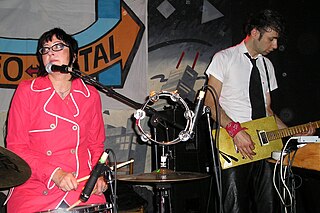
Stereo Total was a Berlin-based multilingual, French-German duo which comprised Françoise Cactus and Brezel ('pretzel') Göring.
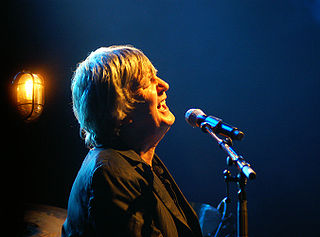
Jacques Joseph Victor Higelin was a French pop singer who rose to prominence in the early 1970s.

Histoire de Melody Nelson is a 1971 concept album by French singer and songwriter Serge Gainsbourg. Produced by Jean-Claude Desmarty, the album was released on March 24, 1971 through Philips Records. Its narrative follows an illicit romance which develops between the middle-aged narrator and fourteen-year-old girl Melody Nelson, portrayed on the album and its cover art by Gainsbourg's then-partner Jane Birkin.

Pierre Barouh was a French writer-composer-singer best known for his work on Claude Lelouch's film A Man and a Woman as an actor and the lyricist/singer for Francis Lai's music score.
Ivor Mervyn Vigors Guest, 4th Viscount Wimborne is a British Grammy Award nominated record producer and Emmy Award nominated composer.

Areski Belkacem, also known simply as Areski, is a French singer, multi-instrumentalist, comedian and composer.

13 chansons décadentes et fantasmagoriques is the first album by experimental French singer Brigitte Fontaine, released in 1966 on the Productions Jacques Canetti label. Fontaine has disowned the album, which she states is merely a "draft" compared to her later works.

Brigitte Fontaine est... folle ! is the third album by experimental French singer Brigitte Fontaine, released in 1968 on the Saravah label. Fontaine herself considers this to be her first real album. Jean-Claude Vannier was responsible for the arrangements.
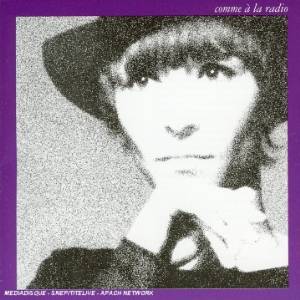
Comme à la radio is the fourth album by experimental French singer Brigitte Fontaine, recorded with Areski Belkacem and the Art Ensemble of Chicago. It was released in 1969 on the Saravah label after a series of concerts in 1969. It is Fontaine's most famous album, and is known outside of France on the 1990s alt-rock scene, thanks to laudatory comments from Beck Hansen, or Sonic Youth among others.
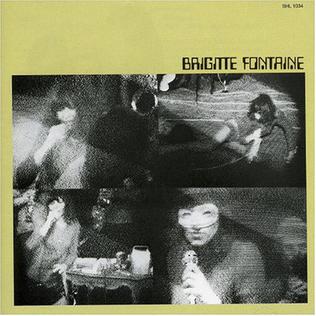
Brigitte Fontaine is the fifth album by experimental French singer Brigitte Fontaine, released in 1972 on the Saravah label.
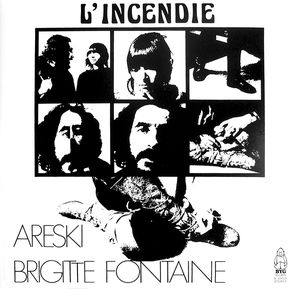
L'Incendie is the seventh album by experimental French singer Brigitte Fontaine and the fifth by Areski Belkacem, released in 1974 on the Byg Records label. It is their third collaborative album.

Le Bonheur is the eighth album by experimental French singer Brigitte Fontaine and the sixth by Areski Belkacem, released in 1975 on the Saravah label. It is their fourth collaborative album.

15 chansons d'avant le déluge, suite et fin is a compilation by experimental French singer Brigitte Fontaine and French rock singer Jacques Higelin, released in 1976 on the Productions Jacques Canetti label.

Kékéland is the fourteenth album by experimental French singer Brigitte Fontaine, released in 2001 on the Virgin Records label. It is almost entirely composed of collaborations. Fontaine exceptionally wrote two songs in English. Y'a des zazous is one of her rare covers, of French singer Andrex.
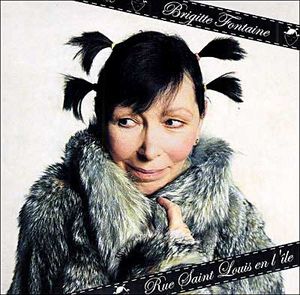
Rue Saint Louis en l'Île is the fifteenth album by experimental French singer Brigitte Fontaine, released in 2004 on the Virgin Records label. It features a new version of Le Nougat from her French corazon album with Mustapha and Hakim Amokrane of French band Zebda, as well as a duet with Areski Belkacem, Le Voile à l'école. There's also a cover of Édith Piaf, L'Homme à la moto, which was present before on an hommage album to the singer, in the words of Fontaine, "just to show off".

Libido is the sixteenth album by experimental French singer Brigitte Fontaine, released in 2006 on the Polydor label. It once again features a collaboration with -M- on the song Mister Mystère, which -M- also sang solo on his fourth album, to which it gave its title. Brigitte Fontaine, for the first time in more than thirty years, calls upon arranger Jean-Claude Vannier for some songs, Barbe à papa and Mendelssohn. The title of Château intérieur comes from a book by Teresa of Ávila, although Fontaine admitted she didn't read it.

L'un n'empêche pas l'autre is the eighteenth album by experimental French singer Brigitte Fontaine, released in 2011 on the Polydor/Universal label. Like Kékéland in 2001, it is mostly an album featuring duets. There are only four originals, the other songs are new recordings of rarities and older songs.
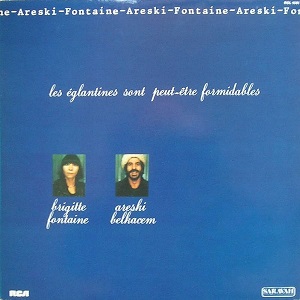
Les églantines sont peut-être formidables is the tenth album by French experimental pop musician Brigitte Fontaine and the eighth by Areski Belkacem, released in 1980 on the Saravah label. Because of its arrangements, described as almost "disco" by Fontaine herself, a sound that she can't stand, she has disowned the album and refused its re-release on CD, although it has been pressed in Japan in October 2008 by the Columbia Music Entertainment label.


















